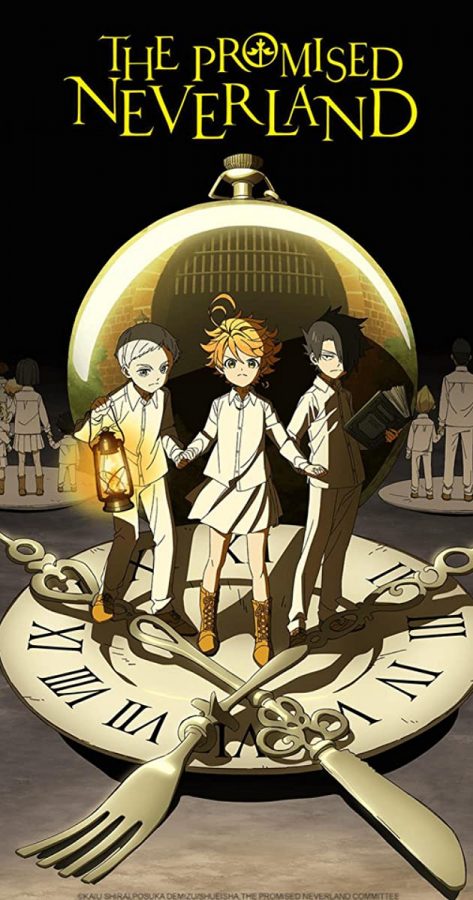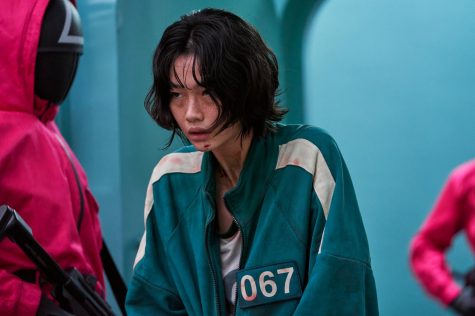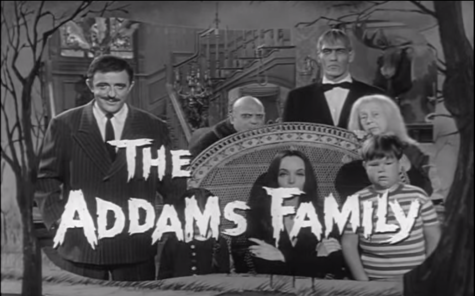“The Promised Neverland” delivers on its promise
Shōnen anime: more often than not, this genre is filled with overdone tropes, flashy fight scenes, and easy-to-locate inspiration from the top manga and anime in the industry. However, the 2019 anime season brought to us a much-needed change of pace within the shōnen scene: “The Promised Neverland.”
The series, originating as an ongoing manga created by the minds of author Kaiu Shirai and illustrator Posuka Demizu made its way to anime for its first season, seeing its debut in America in April of 2019.
Airing Saturday nights on Cartoon Network’s Toonami block, I had the pleasure of watching this season from start to finish. As an already avid fan of the manga, I was very pleased with its adaptation.
“The Promised Neverland” follows the story of three young protagonists: Emma, Ray and Norman. Together, they reside in the Grace Field House, a private, well-regarded orphanage known for raising extraordinary children. Living under the care of their “mother” Isabella, and with 35 other orphans, the three lead a peaceful and joy-filled life. However, after a shocking discovery, the peaceful days they once knew are suddenly taken away. Learning the truth about the place they call home, Emma, Ray and Norman are left with no choice but to find a way to escape the orphanage before time runs out.
The main trio’s difference in personality is perhaps the most compelling part of the narrative. At first glance, they would appear to be unlikely friends. However, as the story progresses, we see that they share an inseparable bond. After learning the dark truth of the orphanage, Emma is the driving force that keeps the trio together, making it her goal to breakout with both Norman and Ray by her side.
The overall writing quality of the show is excellent, and it sent my emotions on a wild ride as I indulged in such a thrilling story. While the plot takes a grim turn early on, there are plenty of moments within these darker times that filled my heart with nothing but warm and fuzzy feelings. Yet, I knew to approach later scenes with caution, as in an instant the goofy grin on my face would be replaced with tears and a mouth agape with horror.
Animated by CloverWorks Inc., “The Promised Neverland’s” art style perfectly replicates the original work of Demizu. What were once black and white pages are now turned into a colorful, moving masterpiece full of energy and life. From depicting the bright and sunny mornings of the past, to the once-joyful faces of the children, “The Promised Neverland’s” animation lends immensely to the tale. Its consistent levels of animation are also a surprise, as in many cases the quality of an anime dwindles over time.
CloverWorks Inc. never failed to present me with breathtaking, shocking, and emotional images that are forever engrained in my mind.
Composed by Takahiro Obata, “The Promised Neverland’s” original soundtrack manages to complement the ominous plot that hides beneath the anime’s surface. From the cheerful instrumentals that play during the days the children spend in ignorance, to a haunting lullaby sung by the children’s “mother,” the compositions of Takahiro Obata subtly add to the setting, providing a sense of calm, mystery, or suspense as you witness the events that unfold.
Performed by UVERworld, “The Promised Neverland’s opening theme song, “Touch Off,” can immediately grab listeners attention as soon as the tune begins. With its infectious and powerful melody, we are presented with a song that conveys determination and a will to break free.
Boasting a cast of new and old faces to the voice-acting scene, “The Promised Neverland’s” English voice casting was exceptional. The actors and actresses took on their roles very well. The overall performance quality was astounding, and the chemistry between the main cast really made the show come alive.
Erica Mendez, the voice of Emma, kept up with the quirky and energetic nature of her character, while having the ability to provide viewers with a heart-wrenching show of emotions in an instant. Laura Stahl, the voice of Ray, accurately portrayed his aloof and snarky personality, while showing the ability to flip a switch that portrays his cunning nature. Providing the voice for Norman, Jeannie Tirado perfectly captures his gentle and kind personality, acting as a perfect contrast to Stahl’s Ray.
Overall, “The Promised Neverland” offers a fresh new story to the world of shōnen anime. If you have been on the lookout for a new series to indulge in, I highly recommend giving the first season of “The Promised Neverland” a chance. Although the first season has ended, there is still more to come. Slated to be released sometime this year, “The Promised Neverland” will be receiving a second season, and I am anxiously waiting to see CloverWorks Inc. work their magic once more.











